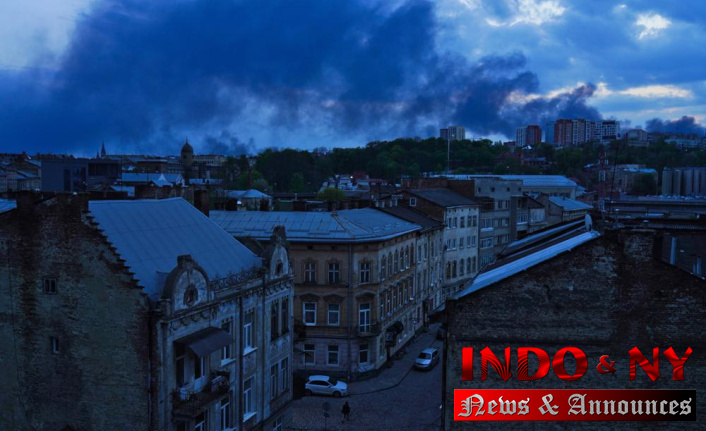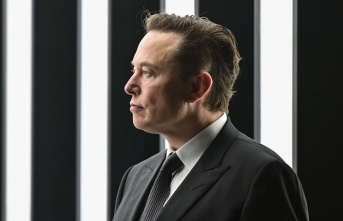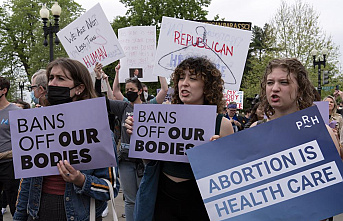ZAPORIZHZHIA (UA) -- Russian forces stormed the steel mill containing the last resistance in Mariupol on Tuesday, Ukrainian defenders claimed. Scores of civilians who fled the bombed-out plant were able to reach relative safety, and they told of nights of despair and fear from constant shelling.
Osnat Lubrani (the U.N. humanitarian coordinator in Ukraine) said that 101 people, including elderly women and 17 children aged 6 months and younger, were able to escape from the Azovstal steelworks bunkers and "see the daylight after 2 months."
One evacuee claimed that she used to go to bed at the plant every night, afraid she would not wake up.
Elina Tsybulchenko, 54, said that it was hard to imagine how frightening it would be when you sat in the shelter in a damp basement, which is shaking, bouncing and shaking. She arrived in Zaporizhzhia (under Ukrainian control), about 140 miles (230 km) northwest of Mariupol in a convoy consisting of ambulances and buses.
She said, "We were praying that missiles fly above our shelter, because it would cause all of us to be killed."
Some of the evacuees were crying as they made their way to a tent that provided some of the comforts they had lost during their time underground. Little children were fed by their mothers. Some of the evacuees went on a search for clothing donated, including new underwear.
For those who were left behind, the news was even worse. According to Ukrainian commanders, Russian tanks backed by tanks stormed the sprawling plant that includes a maze tunnels and bunkers covering over 11 kilometers (4 miles).
It was not clear how many Ukrainian fighters were trapped inside, but Russians have put it at around 2,000 over recent weeks. 500 people were also reported to have been wounded. According to Iryna Vereshchuk, a few hundred civilians remained inside.
"We'll do all we can to repel the attack, but it's urgent that we take immediate measures to evacuate civilians still inside the plant and bring them out safely," Sviatoslav Palmar, deputy commander of Ukraine’s Azov Regiment stated via Telegram.
He said that the plant was also hit with airstrikes and naval artillery fire throughout the night. He said that two civilian women died and 10 were injured in the incident.
Although the U.N.'s Lubrani expressed optimism for more evacuations, he said that none had been arranged.
Volodymyr Zelenskyy, the Ukrainian President, stated in his nightly video address that Russian forces broke agreements regarding safe evacuations by storming the steel plant. Although the previous evacuations were not a victory, he said that they are already a result. There's still hope to save others, I believe.
Other battlefield developments included the shelling by Russian troops of a chemical plant in Avdiivka's eastern city, killing at most 10 people, Pavlo Kyrylenko, Donetsk regional governor, said.
Kyrylenko posted on Telegram that "The Russians knew exactly what to aim for -- the workers just completed their shift and were waiting at a bus stop to take home their bus," "Another cynical offense by Russians on Our Land."
In Lviv, a city in western Ukraine near the Polish border, explosions were also heard. According to the mayor, the strikes caused damage to three power substations and knocked out some electricity supply. Two people were also hurt. Lviv was a refuge for refugees fleeing eastward fighting and has served as a gateway to NATO-supplied weapons.
Authorities said that a rocket also hit an infrastructure facility in Transcarpathia in Transcarpathia. This is a far western region of Ukraine bordering Poland, Hungary and Romania. No immediate information was available about any injuries.
Maj. Gen. Igor Konashenkov, spokesperson for the Russian Defense Ministry, stated that Russian aircraft and artillery had hit hundreds of targets over the past day. These included troop strongholds and command posts, artillery positions and fuel and ammunition depots as well as radar equipment and radar equipment.
According to Ukrainian authorities, the Russians attacked at most a dozen railway stations in the country.
Two weeks ago, Russian President Vladimir Putin directed his military to not storm the Azovstal steelworks to kill the defenders. Instead, he ordered them to seal the place off. The U.N. and Red Cross managed to manage a brief ceasefire that allowed the first and only civilians from the plant to flee.
A reception center in Zaporizhzhia had stretchers and wheelchairs ready and waiting for the convoy. The medical and psychological teams were ready.
Some elderly evacuees looked exhausted when they arrived. Many of the older people, particularly mothers who were comforting their babies and other young children, seemed relieved.
"I'm very happy to be on Ukrainian soil," declared a woman who only gave her first name Anna and arrived in Kiev with her two children, ages one and nine. "We believed we wouldn't be able to get out of there, honestly speaking."
A small group of women raised signs in English asking for fighters to be evacuated from Steel Plant.
The arrival of the evacuees was an unexpected piece of good news after a nearly 10-week-long conflict that left thousands dead, caused millions of people to flee their country, destroyed towns and cities, and altered the balance of power in Eastern Europe.
Lubrani stated, "Over the last days, traveling alongside the evacuees I have heard mothers and children speak about the trauma of living every day under unrelenting heavyshelling and fear, and with an extreme lack of water and food." They spoke about the horror they had experienced.
Lubrani stated that in addition to 101 people who were evacuated from the steelworks', 58 others joined the convoy in a nearby town. Lubrani stated that about 30 people who fled the plant chose to remain in Mariupol to search for their loved ones. She said that 127 people were evacuees who arrived in Zaporizhzhia.
According to the Russian military, some of the evacuees opted to remain in areas controlled by pro-Moscow separatists.
Tsybulchenko denied Russian claims that Ukrainian fighters would not allow civilians to leave the facility. She claimed that the Ukrainian military had told civilians they could leave, but they would have to risk their lives if they did.
She stated, "We knew that we would not survive under these murder weapons. We wouldn't be able to go anywhere."
Mariupol is now a symbol of the human misery caused by war. Two-month Russian siege on the strategically important southern port left civilians without food, water or heat. Moscow's forces then razed the city to ashes. This plant has been a major attraction to the outside world.
Russia pulled out of Kyiv during the first weeks of war and declared that it was pursuing the main objective of capturing Ukraine's eastern industrial center, the Donbas.
Mariupol is located in the region. Its fall would deprive Ukraine a vital port. Russia could establish a land corridor from the Crimean Peninsula to Russia, which it took in 2014. This would allow Russia to free up troops to fight elsewhere in the Donbas.
However, Russia's troops along with their allied separatist force appear to have only made minor gains in the eastern offensive.
The West has significantly contributed to Ukraine's resistance. Boris Johnson, the British Prime Minister, announced 300 million pounds ($375million) in new military aid including radars, drones, and armored vehicles.
He delivered a speech remotely to Ukraine's parliament and declared the battle Ukraine's "finest hours", echoing Winston Churchill's words during World War II.
Johnson stated, "Your children will tell their grandchildren that Ukrainians taught the rest of the world that brute force from an aggressor is nothing against the moral power of a people determined for freedom."












